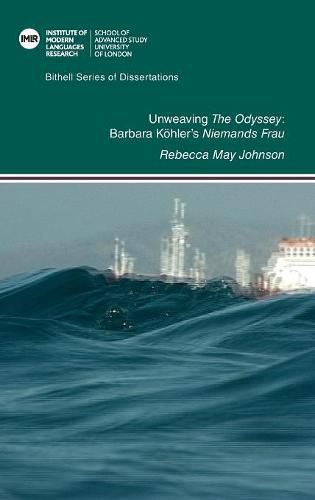Readings Newsletter
Become a Readings Member to make your shopping experience even easier.
Sign in or sign up for free!
You’re not far away from qualifying for FREE standard shipping within Australia
You’ve qualified for FREE standard shipping within Australia
The cart is loading…






How has classical literature shaped culture, knowledge, the thinkable? What happens when a canonical text is translated from his gaze into her, and their, gaze(s)? These are some of the questions Barbara Koehler pursues in her modern epic poem, Niemands Frau (2007), her response to The Odyssey. Translated and re-imagined over the centuries, Homer’s tale found critical resonance in intellectual traditions from Christianity through to Post-Colonialism. Odysseus has been viewed as an ideal, reputedly using reason rather than force to dominate, but in Niemands Frau Koehler takes inspiration from Penelope to weave a text that challenges the rationalist and patriarchal epistemological traditions to which the Odyssey contributes. Readers are invited to cast a critical and deconstructive look back as Koehler unweaves histories of misused power and patriarchy and reweaves a critically alert present, gesturing to a future when life is what counts. This study presents the first detailed analysis of Koehler’s poem, tracing the ways in which she re-invents Homer’s text, from the claim that Niemands Frau is a form of ‘translation’ to its complex re-workings of the Homeric figures Penelope, Helen of Troy, Tiresias and Odysseus.
Rebecca May Johnson completed her PhD at University College London before joining Newcastle University, where she teaches literature and creative writing and is writing a book of creative non-fiction about gender, cooking and researching food in post-war British women’s writing and cookery books.
$9.00 standard shipping within Australia
FREE standard shipping within Australia for orders over $100.00
Express & International shipping calculated at checkout
How has classical literature shaped culture, knowledge, the thinkable? What happens when a canonical text is translated from his gaze into her, and their, gaze(s)? These are some of the questions Barbara Koehler pursues in her modern epic poem, Niemands Frau (2007), her response to The Odyssey. Translated and re-imagined over the centuries, Homer’s tale found critical resonance in intellectual traditions from Christianity through to Post-Colonialism. Odysseus has been viewed as an ideal, reputedly using reason rather than force to dominate, but in Niemands Frau Koehler takes inspiration from Penelope to weave a text that challenges the rationalist and patriarchal epistemological traditions to which the Odyssey contributes. Readers are invited to cast a critical and deconstructive look back as Koehler unweaves histories of misused power and patriarchy and reweaves a critically alert present, gesturing to a future when life is what counts. This study presents the first detailed analysis of Koehler’s poem, tracing the ways in which she re-invents Homer’s text, from the claim that Niemands Frau is a form of ‘translation’ to its complex re-workings of the Homeric figures Penelope, Helen of Troy, Tiresias and Odysseus.
Rebecca May Johnson completed her PhD at University College London before joining Newcastle University, where she teaches literature and creative writing and is writing a book of creative non-fiction about gender, cooking and researching food in post-war British women’s writing and cookery books.